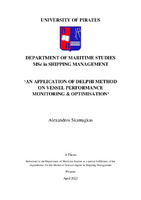An application of Delphi method on vessel performance monitoring & optimisation

Master Thesis
Συγγραφέας
Skamagkas, Alexandros
Σκαμάγκας, Αλέξανδρος
Ημερομηνία
2022-04Επιβλέπων
Karlis, ThanassisΚαρλής, Αθανάσιος
Προβολή/
Λέξεις κλειδιά
Delphi method ; Vessel performance ; Monitoring ; Vessel optimisationΠερίληψη
Στον 21ο αιώνα οι πληροφορίες θα είναι το πιο χρήσιμο εργαλείο ενός πλοιοκτήτη για τη βελτίωση της απόδοσης του πλοίου. Οι επιχειρησιακές αποφάσεις που λαμβάνονται καθημερινά σχετικά με τον τρόπο προγραμματισμού και διεξαγωγής ενός ταξιδιού, την τακτική συντήρηση, την παρακολούθηση της απόδοσης κατανάλωσης καυσίμου και τη συμμόρφωση με κανονισμούς που επηρεάζουν όλα τα αποτελέσματα. Επιπλέον, η επικοινωνία από πλοίο στην ακτή και η διαθεσιμότητα διαδικτύου επί του πλοίου έχει βελτιωθεί σημαντικά, καθιστώντας ευκολότερη τη μεταφορά δεδομένων. Πριν από το 2025, πολλά πλοία, συστήματα και εξαρτήματα θα συνδεθούν με το Διαδίκτυο, καθιστώντας τα προσβάσιμα από σχεδόν οποιαδήποτε τοποθεσία στον κόσμο (The Digital World in 2025). Για αυτό, ένα λογισμικό Ship Performance Monitoring (SPM) με συνεχή παρακολούθηση μπορεί να παρέχει πολύτιμη βοήθεια για το πλήρωμα του πλοίου και τον ιδιοκτήτη. Η βασική ιδέα και απαίτηση για αυτό το σύστημα είναι η μέτρηση βασικών παραμέτρων επί του σκάφους, η εκτέλεση επεξεργασίας αυτών των δεδομένων και η παρουσίαση των αποτελεσμάτων με εύκολο και διαισθητικό τρόπο για το πλήρωμα και το προσωπικό της ξηράς. Τα συστήματα παρακολούθησης της απόδοσης θα αποτελούν αναπόσπαστο μέρος των (περισσότερων) συστημάτων πλοίων στο άμεσο μέλλον, επειδή η διαδικασία λήψης αποφάσεων γίνεται ευκολότερη και πιο απτή όταν βασίζεται σε δεδομένα του πλοίου σε πραγματικό χρόνο, σε αντίθεση με τα δεδομένα που συλλέγονται με μη αυτόματο τρόπο και δύσκολα μεταβιβάσιμα από τους αξιωματικούς του πλοίου.
Η ακριβής και τακτική παρακολούθηση της κατανάλωσης ενέργειας σε ένα μεμονωμένο σκάφος ή σε έναν ολόκληρο στόλο μπορεί να επισημάνει τις αναποτελεσματικότητες και να παρέχει έναν μηχανισμό για συνεχή βελτίωση. Οι πλοιοκτήτες και οι ναυτιλιακές εταιρείες μπορούν να χρησιμοποιήσουν αυτές τις πληροφορίες για να προβλέψουν το κόστος συντήρησης και τον χρόνο, να βελτιστοποιήσουν την κατανάλωση καυσίμου ή να σχεδιάσουν τις συντομότερες διαδρομές μεταξύ των λιμανιών. Η κοινή χρήση δεδομένων χρήσης ενέργειας μπορεί να προωθήσει τις βέλτιστες πρακτικές για αποδοτικές λειτουργίες καυσίμου μεταξύ των πληρωμάτων για τη βελτίωση της απόδοσης. Ο καπετάνιος για παράδειγμα μπορεί να χρησιμοποιήσει τέτοιες πληροφορίες για να βελτιστοποιήσει τον τρόπο με τον οποίο κυβερνά το πλοίο με ασφάλεια.
Η πιο αποτελεσματική χρήση καυσίμου συμβάλλει επίσης στη συμμόρφωση με ολοένα και πιο αυστηρούς κανονισμούς εκπομπών και συμβάλλει στην επίτευξη περιβαλλοντικών στόχων. Αυτές και άλλες παρόμοιες προσπάθειες είναι σύμφωνες με τις κατευθυντήριες γραμμές του ΙΜΟ για την ανάπτυξη ενός Σχεδίου Διαχείρισης Ενεργειακής Απόδοσης Πλοίου (SEEMP) στο οποίο απαιτείται δέσμευση από ολόκληρο τον ναυτιλιακό οργανισμό, από τον επικεφαλής επιχειρησιακό διευθυντή έως ολόκληρο το πλήρωμα, για να παρακινήσει την εταιρική δέσμευση στην εξοικονόμηση ενέργειας.


